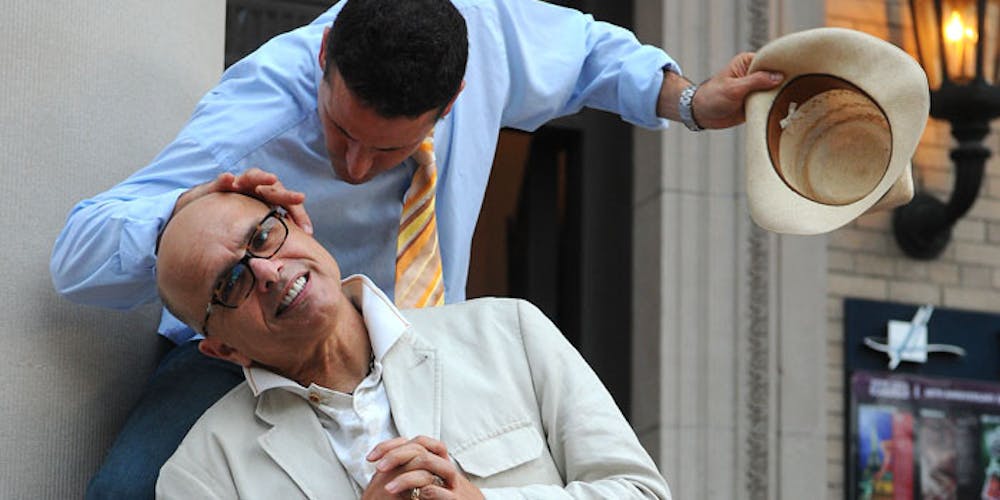What's it like to be Joey Pants?
The influential actor, known for roles like Cypher in "The Matrix," Teddy in "Memento," and Ralphie in "The Sopranos," spent this past week in town writing a book with co-author Eddie Mordujovich. I had the rare opportunity to interview the Emmy-winning actor during his short Gainesville sojourn.
"I can be incredibly dogmatic with people and tease them and play with them and even put them down. And you know 8 out of 10 people just love that Joey Pants is breaking their balls," he said. "I used to have an assistant. I would say, ‘Emulate me! She'd say, ‘I can't emulate you, I'm not you, ya f--k! If I emulate you, I'd get fired!'''
In case you haven't noticed, Joey Pants is kind of a wild card.
My interview with Mr. Pantoliano was scheduled for Tuesday at a new restaurant in town, The Warehouse. I was told it would be a "working dinner" by his handlers. In true celebrity fashion, he was an hour late.
But the thing is, when the man walked through the doors of the restaurant it was a subtle human explosion. He has this sort of energy that made me question the potential of personality. He was magnetic, endearing and extremely polite. He was boisterous in his approach, and when he got to the table he immediately had the whole room's attention. The waitress was hovering, the table was noisy. And in the midst of all this I was battling for his attention.
"I was working with Eddie on a book, and he got hurt. So I came down here because we got a deadline, and I wanted to make it easy for him. The book is called "Tales from the Great Depression," well, that's the working title. It deals with my recovery from mental disease."
He paused for a second, trying to collect his thoughts, and mentioned that it was hard for him to talk with all the chatter around him. We decided to move the interview to the lobby of the restaurant to a cushioned bench on the side wall across from the hostess's station. As we walked down the middle of the room, I felt people's eyes trying not to stare at him when he passed, some with those looks of dusty recognition, like they couldn't place the face.
"One of my issues is that I have attention deficit disorder. I don't take Ritalin, but I do take something like that."
Sitting face to face with Pantoliano I noticed a few things. He smelled pristine. He was dressed immaculately. A clean, white button-up tucked into khakis with a light-blue vest and brown leather, patterned cowboy boots. The man likes jewelry. Three necklaces, two rings on each hand and a bracelet he told me cost five grand. I wanted to understand why this man told me so offhandedly that he suffered from a mental disease.
He explained that he was filming a movie around 2006, and as a matter of procedure he was asked to undergo a physical. The insurance company funding the project felt he was a risk because he was taking anti-depressants. It asked him to sign a waiver stating that if there was stoppage due to a nervous breakdown or something similar he would be financially responsible.
"I said, ‘Wait, I have a history of heart disease. I take [a] statin for my cholesterol. Why are you insuring my heart but not my brain? And they didn't have a good answer for that."
With this as his impetus, Pantoliano started a charity called No kidding, Me Too!, with a mission of removing the stigma attached to brain "dis-ease through education and the breaking down of societal barriers." The goal is to get people to "admit their illness, seek treatment and become even greater members of society."
During this passionate speech about his experiences with clinical depression, I was struck with this man's ability to channel himself emotionally. He drew me in with his charisma. He explained that when your child is sick with asthma you take them to the doctor, but when he's depressed you just don't talk about it, and therein lies the problem. People should talk about feeling depressed or mentally unstable, so that they can get help.
"Stigma is predicated on discrimination," he said. "It's not stigma, it's prejudice."
The actor said he's been blessed to have over a 30-year career in the movie business, and his acting talent is helped by his mental difficulties. As an actor he was encouraged to have a child-like wonder and spontaneity, qualities that don't bode well for the real world, he said.
"If I'm spontaneous and this waitress wants to f--k me (he pointed to a waitress who walked by), that's gonna get me in a lot of trouble with my wife."
He thought when he became rich and famous he'd finally be happy, but it wasn't so. He developed an addiction to painkillers and said at one point he took a bunch of them in the hopes that he wouldn't wake up in the morning.
Today, Pantoliano is in a 12-step recovery program, and said he is happier and more cognizant of things now than he's ever been. The most important thing in life isn't fame or riches, but love and family, he said.
"I wanted to make enough money for my children and my children's children, but the truth is unless they make their own money they're going to have miserable lives."
After the interview I left Pantoliano at a table, surrounded by women. He was telling stories about being famous and acting in movies that I'd seen dozens of times growing up. It was so strange to see this man, full of personality, sparkling in his element. There was a disparity between the entertainer and the man. But I guess that's just Joey Pants.






